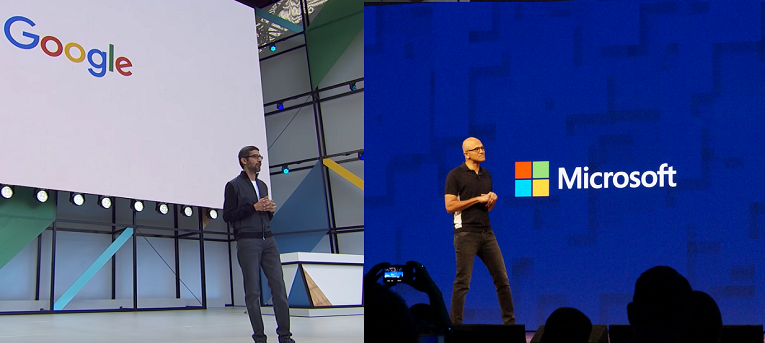Google CEO Sundar Pichai and Microsoft CEO Satya Nadella.
Following Microsoft’s support for Australia’s News Media Bargaining Code that doesn’t actually require they do anything at the moment, Google has taken the opportunity to “debunk” a few of the claims coming out of Redmond.
Google, alongside Facebook, has been engaged in a stoush with the Australian government, since August over the News Media Bargaining Code that entered the House of Representatives in late December.
The bargaining code, according to the government, is necessary to address the fundamental bargaining power imbalances between Australian news media businesses and major digital platforms.
But according to Google, the code is “unfair”, saying also it puts the “way Aussies’ search at risk”. Google believes it contains an unfair arbitration process that “ignores the real-world value Google provides to news publishers and opens up to enormous and unreasonable demands”.
This battle culminated last month in Google threatening to pull its search engine from Australia.
Microsoft vice president Brad Smith on Thursday published a blog post that praised the government for the code and said the US should take notice, even going as far as saying the code should be copied by the Biden Administration.
“Microsoft’s take on Australia’s proposed law is unsurprising — of course they’d be eager to impose an unworkable levy on a rival and increase their market share,” Google SVP of corporate affairs and the search giant’s chief legal officer Kent Walker wrote in a blog post on Friday.
“But in its eagerness, Microsoft makes numerous claims that have been thoroughly and independently debunked.”
Walker’s post reiterated that Google has no problem paying for news content in Australia, just not the way the government wants.
“But we and others have pointed to significant concerns with the proposed Australian law, while proposing reasonable amendments to make it work,” he said. “The issue isn’t whether companies pay to support quality content; the issue is how.”
The blog pointed to remarks made by others on the code, such as the inventor of the World Wide Web, Tim Berners-Lee, who is concerned it risks breaching a fundamental principle of the web. It also says that more than 80% of the submissions to the Australian Competition and Consumer Commission (ACCC) oppose it.
“The law would unfairly require unknown payments for simply showing links to news businesses, while giving, to a favoured few, special previews of search ranking,” Walker continued. “Those aren’t workable solutions and would fundamentally change the Internet, hurting the people and businesses who use it. But there are better ways, and we’re committed to making progress.”
Over in New Zealand, instead of asking the tech giants pay what is essentially a legacy media subsidy, the government has announced a NZ$55 million, three-year fund to help ensure “public interest journalism” continues.
The fund will be administered by NZ On Air and reports from local media indicate it will be available to media outlets to fill a public interest service which otherwise would not be produced without the funding.
Without any clause written into Australia’s code dictating that publishers must pass the money on to the actual creators of the content, and ignoring the layoffs that have plagued the industry for the last couple of years, ACCC chair Rod Sims reckons the code will result in more journalists in Australia.
Speaking before the Senate Economics Legislation Committee last month, he said money gained by publishers through the process will cover a “substantive and meaningful” amount of journalism and therefore “make a significant contribution to journalism in Australia”.
“I think it’ll both stem some of the problems and allow extra journalists to be employed,” he said. “I think it’ll be a significant increase in journalism, compared to the alternative, with this code. And therefore, with more journalism, we’ll get more diversity in media, which is good, and we’ll get more coverage of more things which just can only help Australian society.”



